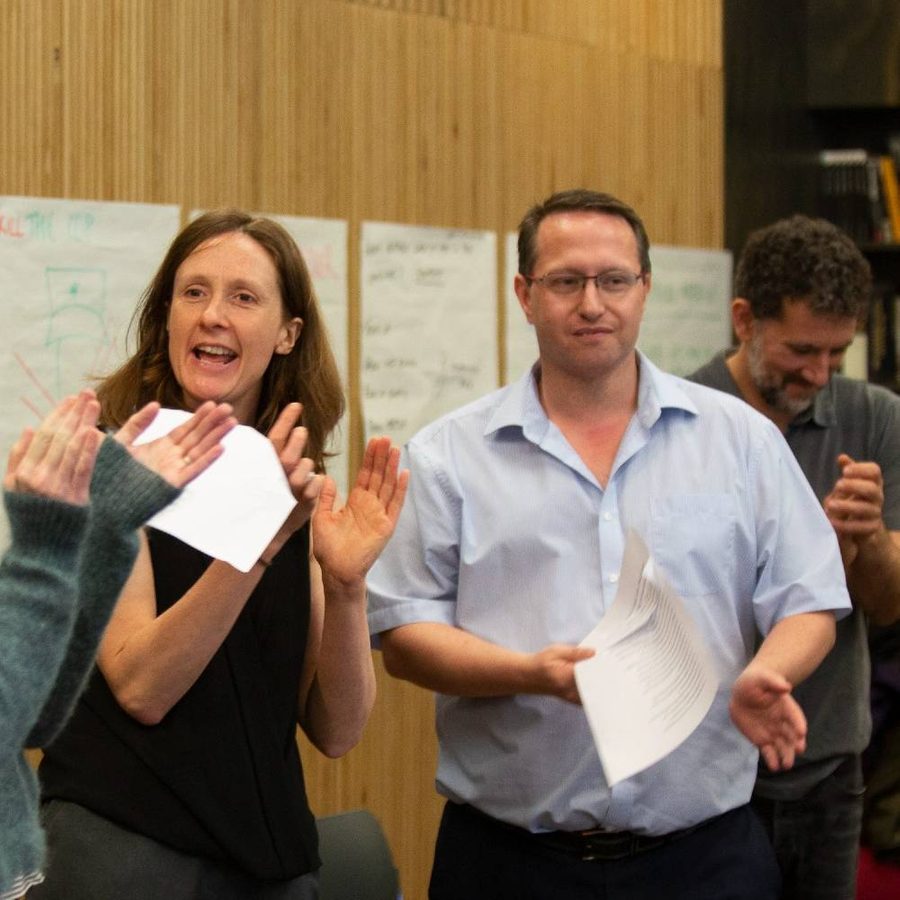
September is the season for budget setting and costs are tightening for the year ahead. However, ‘soft skills’ are always needed in business.
Lucy Cleveley, Head of Organisational Development at the National Theatre, explores the importance of these skills and how you can make room in your training budget for them.
Sign up to our new Theatreworks mailing list!
Be the first to hear about what’s on and how we can help your business.
What are ‘soft skills’ and why do we need them?
The funny thing about soft skills is they are not ‘soft’ at all. True, they are not the literal hands-on practices like accounting, programming, design, construction or IT that you may need to ply your chosen trade, but neither are they innate. These people-focused skills range from body language and voice projection to listening, negotiating and communicating clearly. All require equal investment, training and practice to develop and master.
Sanjay Karia, Head of Faculty IT (Humanities & Social Sciences) at UCL explains their importance, regardless of your job role:
There can be a misconception that people in IT are ‘tech heads’ working in isolation. This is not the reality. A good IT team needs more than just technical training. Investing in developing soft skills helps to improve collaboration and communication. It builds well-rounded individuals, equipping them with the tools – and confidence – they need to deal with stressful situations and deliver good customer service.
There has been a call to rename soft skills to reflect their importance. ‘Professional development’ is a favourite, but it still doesn’t quite capture the role they bring to any workplace – promoting teamwork, cultivating confidence and elevating people out of the day-to-day to help them excel.
Whatever you choose to call them, these human skills deserve at least a dedicated line item or separate funding pot in your training budget.

Lucy Cleveley, Head of Organisational Development (National Theatre)
Budgeting beyond the basics
There is a growing awareness around the need to cultivate these skills. Many organisations allocate at least some of their training budget to encompass ‘leadership development’, which courses like Theatreworks can fulfil.
While this is a start, it is important to recognise the importance of soft skills development across whole teams, and to prioritise training programmes for them on the same level as ‘practical’ skills development. This can be difficult when budgets are tight, especially in industries with ever-evolving technology, health and safety, or security regulations. A hybrid approach that combines techniques like microlearning, on-the-job training and interactive online courses can help keep teams up to date on the latest requirements and still leave room in the training budget, and their schedules, for professional development.
Allocating separate budgets or funding pots can also help to ensure that practical skills and more people-focused training courses aren’t competing with each other for their share of the spend. Ensuring that everyone across teams and departments has access to training also helps to provide consistency and a culture of personal and professional development, reinforcing Sanjay’s testimonial that programmes like Theatreworks provided well-rounded teams, no matter their skillset or area of expertise.

Building your team's soft skills
From our open courses or bespoke packages, we provide training on vital skills like personal impact and how to build rapport at work. Take a look at what we have to offer.
A measurable difference
In a climate where every penny counts, it can be difficult to prove return on investment in soft skills. This is mainly down to perception, as the skills that courses like Theatreworks help to build generally aren’t noticed unless they are absent.
It important to view these courses not as one off ‘fixes’ to staff issues, but as with any type of training, opportunities to develop essential workplace skills. One of the best ways to measure success is to set clear objectives before team members take part in the course, so participants can report back with examples on how it helped to fulfil these objectives. For example, did the skills they learned help to prepare them for a big presentation? Or help a new starter build confidence to participate in meetings?
Consider scheduling regular follow-ups to ensure the skills are not forgotten and that team members continue to practice and apply what they’ve learned – making the most of your investment in their learning.
Investing in the future
Sanjay explains in further detail:
I’ve seen a lot of value from the start. After sending my first employee on a Theatreworks open course, I really noticed the difference it made to their confidence. The exercises really got them to come out of their shell and step out of their comfort zone. Every single person who has taken part has thanked me afterwards and can’t wait for the next one. They have all had really positive experiences.
Since then, Sanjay hasn’t looked back. Theatreworks is now part of his ongoing training plan. He sends one team member on every open course so they can get the full experience without the pressure (or comfort blanket) of taking part with colleagues.
Interacting with people from different industries and roles has been really beneficial in building their confidence and communication skills. My job is not just to help to them in their current role, but for the future, he concludes. It is my responsibility to support my team’s career aspirations, which is why I think soft skills are so important.
Read more articles about Theatreworks
If you’re interested in learning more about Theatreworks and what we can do for your business, please get in touch: theatreworks@nationaltheatre.org.uk.